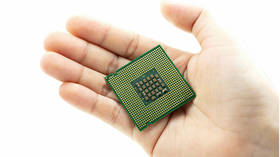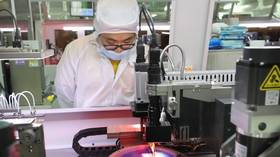Dire warning issued for global chip industry

Taiwan Semiconductor Manufacturing Company (TSMC), the world's largest and most valuable chip manufacturer, will become “non-operable” if a war breaks out between Taiwan and China, Chairman Mark Liu has warned in a video-interview, published by CNN on Monday. TSMC makes around 90% of advanced chips produced globally.
“Nobody can control TSMC by force… You will render TSMC factories non-operable. Because these are such sophisticated manufacturing facilities… they depend on the real-time connection with the outside world, with Europe, with Japan, with the US, from materials to chemicals to spare parts,” Liu said.
Liu also stressed that chipmaking will no longer be “the most important thing we should be worried about” if a conflict broke out.
He noted, however, that China needs TSMC to continue working, because “our interruption will create an economic turmoil in China, because suddenly their most advanced components supply would disappear” in case of war. Therefore, Liu urges China to “think twice.”
“The war can only create problems on all three sides. The war brings no winners, everybody is a loser,” he said, referring to China, Taiwan and the global semiconductor market.
Liu also addressed the current conflict in Ukraine, saying that lessons should be learned from it, as the situation there has created a “lose-lose-lose scenario” for the Western world, Russia, and Ukraine. He said China and Taiwan should avoid conflict so that the “engine of the world economy can continue humming.”
Liu’s interview comes at a time of heightened tensions between Beijing and Taipei, which in part stem from the potential visit by US House Speaker Nancy Pelosi. Taiwan is a self-ruled island nation, which Beijing considers part of its sovereign territory. In a video-call last week, Chinese President Xi Jinping told his US counterpart Joe Biden that America was “playing with fire” by not preventing such visits by US delegations to the region, as Beijing views them as “interference by external forces” in its internal affairs.
For more stories on economy & finance visit RT's business section













